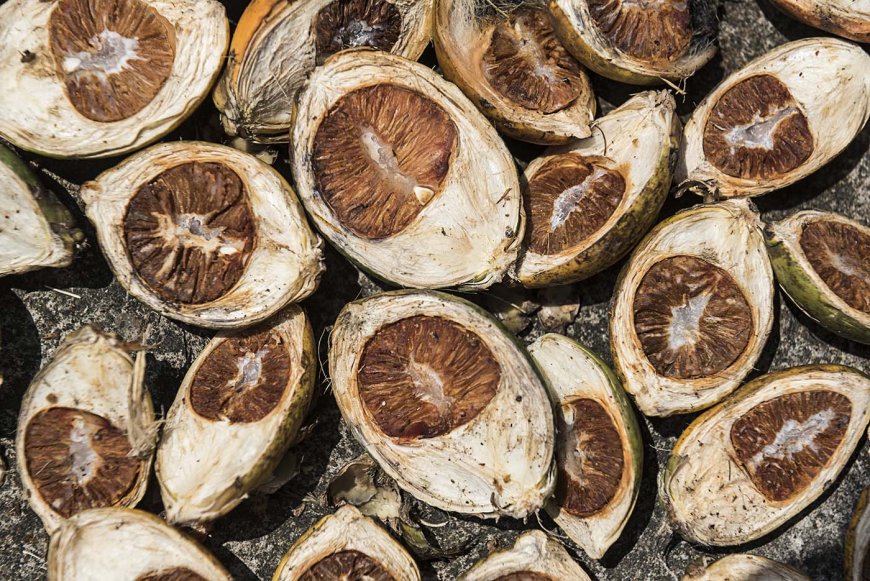Benefits and Risks of Betel Nut (Areca Catechu) Use!
Uncover the truth about Betel Nut (Areca catechu) use and learn about its potential health benefits and risks. Get informed before you decide to try this ancient remedy!

Betel nut (areca catechu) has been used for centuries in traditional Asian medicine, and its popularity is on the rise. With a variety of health benefits and potential risks associated with it, betel nut can be both beneficial and dangerous if not taken responsibly. In this blog post we will explore all aspects of betel nut use - from understanding what it is to uncovering the truth about addiction- so that you can make an informed decision when considering using this ancient remedy. We'll also look at how areca catechu fits into Ayurvedic Medicine as well as provide a list of top 10 health benefits associated with betel nut consumption. So join us now as we dive deep into exploring everything there is to know about Betel Nut (Areca Catechu).
Table of Contents:
- What is Betel Nut?
- All About Areca catechu
- The Top 10 Health Benefits of Betel Nut
- Understanding the Risks of Betel Nut Use
- The Truth About Betel Nut Addiction
- Conclusion
What is Betel Nut?
Betel nut, also known as areca nut, is a seed from the Areca catechu palm tree. It has been used for centuries in parts of Asia and the Pacific Islands as a stimulant and to aid digestion. The betel nut is typically chewed with other ingredients such as lime or tobacco, wrapped in a leaf called paan.
Definition of Betel Nut:
Betel nut is an oval-shaped seed from the Areca catechu palm tree that can be chewed or ground into powder form for medicinal purposes. It has a mild flavor and aroma similar to that of cardamom or cinnamon.
History of Betel Nut:
Betel nuts have been used by people in Southeast Asia since ancient times for their stimulant effects and to aid digestion. In India, it was traditionally offered to guests during special occasions like weddings and festivals. The use of betel nuts spread throughout East Asia over time until it eventually reached Europe during the 16th century via Portuguese traders who brought them back from India.
Today, many people still chew betels regularly but some countries have banned its sale due to health concerns related to long-term use including oral cancer risks associated with chewing tobacco along with it (if present). Additionally, modern research suggests that consuming large amounts may lead to increased risk factors for stroke among other cardiovascular issues so caution should be taken when using this product medicinally or recreationally alike.
Betel nut has been used for centuries in traditional medicines, and its unique properties have made it a popular commodity around the world. As we learn more about Areca catechu, let's take a closer look at the botanical description, geographical distribution, and cultivation of this important plant.
All About Areca catechu
Areca catechu, commonly known as betel nut, is a species of palm tree native to South and Southeast Asia. It has been used for centuries in traditional medicine and cultural ceremonies. The botanical description of Areca catechu includes a single-stemmed evergreen tree that can reach heights up to 30 feet tall with large pinnate leaves that are dark green in color. Its fruit is an oval drupe containing one seed surrounded by a yellowish fleshy layer.
The geographical distribution of Areca catechu spans from India eastward through the Philippines, Malaysia, Indonesia, and Papua New Guinea. It grows best in tropical climates with high humidity levels and plenty of sunlight exposure. In some areas it is cultivated for its edible fruits while in others it is grown primarily for its medicinal properties or as an ornamental plant.
Areca catechu is a unique and versatile plant with many potential health benefits, making it an ideal choice for those looking to improve their overall wellbeing. With its numerous beneficial properties, Betel Nut could be the perfect addition to your daily routine.
The Top 10 Health Benefits of Betel Nut
It has been used for centuries in traditional medicine due to its many health benefits. Betel nut contains several important nutrients such as proteins, fats, carbohydrates, vitamins A and C, calcium and phosphorus. In addition to these essential nutrients it also contains several active compounds that are beneficial for human health.
Nutritional Value of Betel Nut:
The betel nut is an excellent source of nutrition with high levels of protein and dietary fiber. It also provides small amounts of essential minerals like iron, magnesium and zinc which can help boost energy levels and support the immune system. Additionally, betel nuts contain a range of B-vitamins including thiamin (B1), riboflavin (B2) niacin (B3) pantothenic acid (B5), pyridoxine (B6) folate (B9) biotin( B7).
Antioxidant Properties of Betel Nut:
Betel nuts are rich in antioxidants which have been linked to reducing inflammation throughout the body as well as protecting against oxidative stress caused by free radicals. These antioxidants include polyphenols such as gallic acid which helps protect cells from damage caused by toxins in the environment or our own bodies’ metabolic processes. Other antioxidants found in betel nuts include flavonoids like quercetin which may reduce risk factors associated with chronic diseases like cancer or heart disease.
Cardiovascular Benefits of Betel Nut:
Studies suggest that regular consumption of betal nut may help improve cardiovascular health by lowering cholesterol levels while increasing HDL “good” cholesterol levels in the blood stream . This can help reduce risk factors associated with stroke or heart attack since elevated LDL “bad” cholesterol increases plaque buildup on artery walls leading to blockages over time . Furthermore , research suggests that consuming betal nut regularly may even lower blood pressure slightly .
Gastrointestinal Benefits Of Betal Nut:
The dietary fiber content present within betal nuts can be beneficial for digestive health since it helps promote regular bowel movements while preventing constipation . Additionally , studies suggest that consuming this type of fiber may even help reduce symptoms related to irritable bowel syndrome such as bloating , cramping , diarrhea etc Lastly , some research indicates that eating more plant based foods containing dietary fibers could potentially decrease your risk for developing colorectal cancer over time .
Betel nut has been used for centuries to provide many health benefits, from improving the immune system to providing antioxidants and cardiovascular support. However, it is important to understand the risks associated with using betel nut in order to ensure safe consumption. Let's explore these potential risks and long-term effects of using betel nut next.
Understanding the Risks of Betel Nut Use
It has been used for centuries as a stimulant and for medicinal purposes. While it can have some health benefits, there are also risks associated with betel nut use that should be taken into consideration before using it.
Side Effects and Interactions with Medications from Using Betel Nut: The most common side effects of betel nut include nausea, dizziness, dry mouth, headache, insomnia and increased heart rate. In addition to these side effects, betel nut may interact with certain medications such as anticoagulants (blood thinners), anti-seizure drugs and antidepressants. Therefore it is important to consult your doctor before taking any medication while consuming betel nut in order to avoid potential interactions or adverse reactions.
Risk Factors for Overdosing on Betel Nut:
Consuming too much betel nut can lead to an overdose which can cause serious health problems including seizures and coma. People who are pregnant or breastfeeding should not consume betel nuts due to the risk of overdosing on this substance which could harm their unborn baby or infant child respectively. Additionally people who suffer from liver disease should not take this supplement since it could worsen their condition further if consumed in excess amounts over time.
It is important to understand the risks of betel nut use before consuming it, as there can be serious health implications. In the next section we will explore how a person may become addicted to betel nut and what treatment options are available for those who find themselves in this situation.
The Truth About Betel Nut Addiction
Betel nut addiction is a serious problem that affects many people around the world. It is an addictive substance derived from the Areca catechu plant, which grows in tropical climates and has been used for centuries as a stimulant and medicine. Betel nut contains alkaloids such as arecoline, which can cause physical dependence if consumed regularly over time. Understanding the signs and symptoms of betel nut addiction, treatment options available, and how to prevent relapse are important steps in helping those who struggle with this issue.
People who become addicted to betel nut may exhibit changes in their behavior or moods when not having access to it. Cravings for the substance can also arise, and an urge to use more than usual might be present when there is availability of it. Irritability or restlessness, difficulty sleeping, weight loss due to decreased appetite, anxiety or depression related to withdrawal symptoms upon abstaining from its use are other signs that may occur. Neglecting responsibilities at home or work because of its usage as well as financial problems caused by buying large amounts on a regular basis could be additional indicators of addiction.
Treatment for betel nut addiction typically involves a combination of cognitive-behavioral therapy (CBT) and medication management. CBT helps individuals identify triggers that lead them towards using betel nuts, as well as teaching healthier coping skills instead of relying on the drug itself for relief from stressors in life. Medication management can help reduce withdrawal symptoms associated with quitting cold turkey by providing medications such as antidepressants which may be used to regulate mood swings during detoxification periods off the drug while gradually tapering down doses until completely stopped under medical supervision only.
Betel nut addiction is a serious problem that affects many people around the world. It can be difficult to recognize and even harder to treat, but with the right help, it is possible to overcome this addiction. In this article, we will discuss the signs and symptoms of betel nut addiction, treatment options available for those struggling with an addiction to betel nuts, and ways to prevent relapse into an addictive state.
The most telling sign of betel nut addiction is compulsive use or an intense craving for the substance. Other indicators include irritability when not using, increased tolerance, changes in sleep patterns, physical withdrawal symptoms such as headaches and nausea, financial problems caused by excessive spending on betel nuts, neglecting responsibilities to obtain more of the drug and difficulty controlling consumption despite negative consequences.
Treatment Options for a Betel Nut Addiction:
Treatment options vary depending on individual needs but typically involve counseling sessions with trained professionals who specialize in treating addictions. Medications may also be prescribed by doctors if needed. Cognitive-behavioral therapy (CBT) can help individuals identify triggers that lead them back into addictive behaviors so they can better manage their cravings and avoid relapsing into an addictive state again. Additionally, support groups are often beneficial as they provide additional resources for recovering addicts while helping them build meaningful relationships with other people who have experienced similar struggles with addictions themselves.
Conclusion
While it can offer some health benefits, there are also risks associated with its use that should be taken into consideration. Betel nut addiction is a real concern, so if you choose to use this substance, make sure to do so responsibly and in moderation. Ultimately, the decision whether or not to consume betel nut is up to you - just remember to weigh the pros and cons before making your choice.
Areca catechu, or betel nut, is a tropical evergreen tree with many potential benefits. Unfortunately, it has also been linked to some serious health risks. We must work together to find sustainable solutions that ensure the safe and responsible use of this plant while still allowing people access to its medicinal properties. Join us in our mission to create better awareness about Areca catechu and how we can protect both human health and the environment by advocating for effective policies on its cultivation and sale!




















































































































